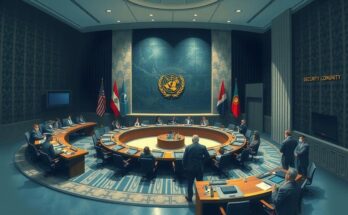Chinese media has reported extensively on recent incidents involving Donald Trump, particularly his contentious meeting with Ukraine’s President Zelenskyy and his plans regarding Gaza. These events have been interpreted as clear indicators of the declining U.S. influence in international politics and a rejection of traditional alliances. Chinese state outlets emphasize a commitment to dialogue and respect for Palestinian sovereignty, contrasting their stance with U.S. policies.
Recent coverage by Chinese media has intensified around the actions of former President Donald Trump in relation to Ukraine and Gaza. Notably, the humiliating meeting with Ukraine’s President, Volodymyr Zelenskyy, on February 28, signified a stark shift in U.S. policy, alarming European nations and undermining the transatlantic alliance. Concurrently, a controversial proposal was unveiled on February 4, where Trump announced plans for U.S. control over Gaza, meeting with Israeli Prime Minister Benjamin Netanyahu, leading to widespread rejection from the Arab world.
Following these events, official remarks from China were scarce, particularly in connection to Zelenskyy’s humiliation. However, Chinese officials voiced their disapproval of the resulting displacement of Gazans while refraining from directly criticizing the U.S. or Trump. Commentary from major Chinese state media outlets such as the Global Times and People’s Daily reflected a broader concern regarding the deterioration of international relations and the implications of America’s withdrawal from its global commitments.
Commentaries in Chinese media primarily emphasized the weakening of the U.S.-led political order and cautioned against relying solely on the U.S. for diplomatic support. People’s Daily published insights suggesting that meaningful negotiation requires inclusivity beyond just U.S.-Russia dialogues, emphasizing the necessity of addressing broader geopolitical realities. Furthermore, they argued that public displays of negotiations could lead to posturing overshadowing substantive discussions.
Global Times acknowledged the complexity of the crisis following the Oval Office meeting, suggesting that Trump’s presidency might confront greater challenges than anticipated. The outlet contended that the transatlantic alliance now faces the risk of transition from shared values to a transactional relationship under the U.S. “America First” strategy.
Regarding Gaza, Chinese media communications highlighted a commitment to a peaceful resolution while reiterating the region’s Palestinian identity. Foreign Minister Wang Yi asserted that Gaza rightfully belongs to the Palestinians. Furthermore, experts provided substantial criticism of Trump’s plans, emphasizing that the governance of Gaza should reflect the will of its residents rather than be dictated by external powers.
Reports from Chinese outlets noted significant dissent among international observers regarding Trump’s proposals for Gaza, with various media, including the BBC and CNN, labeling them as contravening international law. This illustrates the broader skepticism towards U.S. policy in the Middle East and reflects China’s advocacy for a multipolar world founded on mutual respect and dialogue.
The representation of U.S. actions in Ukraine and Gaza by Chinese media highlights significant geopolitical shifts. Chinese outlets emphasize the weakening influence of the U.S. in international relations while advocating for a multilateral approach to diplomacy. As China critiques U.S. policy, particularly regarding Palestine, it continues to underscore the importance of respecting national sovereignty and promoting peaceful resolutions. The ongoing developments reflect broader tensions between differing global powers, and China’s perspective serves as a counterpoint to the U.S. narrative.
Original Source: indianexpress.com




